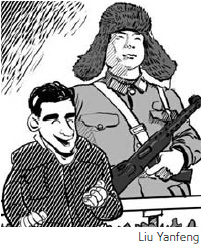Three days before I left for China, a salesperson thought I was 16. I was, actually, a 21-year-old college graduate - no, I was a despondent 21-year-old college graduate.
By that point, I had spent much of my late teens trying to will myself into outgrowing my short height and baby face - without success. But a propaganda sign in Beijing turned my anxiety to joy when I learned that being cute was now a government mandate. "Zuo wei ke'ai de ren," the sign said, "Be a cute person."
In the time it took me to decipher the six characters, my baby face had gone from being a liability to a prerequisite for a model citizen. I was ecstatic to learn that the difference between cute and national hero was all a matter of perspective.
The sign assured me I wasn't a college graduate that looked like a middle schooler; I was a Lei Feng of the new millennium, a citizen upheld by the government as a model for others. Soon there would be sittings for propaganda poster paintings (which would be a breeze with such a cute face), national parades, and stacks upon stacks of royalty checks.
My Chinese friends think it's weird that I stop and read the propaganda signs that dot China, but I think my self-esteem boost proves the signs are worthwhile. To my Chinese friends, the signs are like wallpaper in a house they've grown up in. But if they did pay attention they'd notice that:
Propaganda posters can be startlingly direct and out of date, like a sign I saw in Guizhou province that urged simply: "Comrade, please speak Mandarin."
Propaganda posters can be comically modern, like a sign I saw in the Guangzhou subway that had a dancing person that looked as if it came straight from an iPod ad and a slogan that read: "Mandarin: modern needs, fashionable pursuits."
Propaganda posters can be humorously parent-esque, like a sign outside the Guangzhou train station with a cartoon ram giving a thumbs up, advising: "Don't trust strangers." A nearby sign said, "Don't eat those cookies! You'll ruin your dinner."
Propaganda posters can seem hilariously obvious, like a small metal plate in a village that read: "If you have a dispute, go to court."
a dispute, go to court."
They can also offer insights on what people want China to be, like a huge red-and-white sign I saw in Chaozhou proclaiming: "Have a boy; have a girl; it's all the same. Girls continue the family line too."
Propaganda posters can be optimistic to the point of fantasy, yet some can be strangely modest. It's only after you start getting used to the detached-from-reality optimism of propaganda signs that a sign hung at the super-elite high school where I taught seems funny: "Let's try to be fluent English speakers." Just try?
Or they can be disappointing, like the "be a cute person" sign. When I returned home, my joy at being declared cute came to a tragic end when I learned that "being a cute person" has a different meaning altogether.
"Being a cute person" is a revolutionary idea referring to someone who makes great contributions to the country. Normally, soldiers, volunteers and others who have made great sacrifices for the country count as "cute." (Here, ke'ai's literal meaning of "lovable" is probably a better translation; we should love these people because they help the country.)
Learning of the true requirements for national heroes, I was as sad about my baby face as I was when I left for China. Having a young face and teaching English may not be easy, but I still had more hurdles to clear before being knighted as "cute."
In the meantime, I'm urging my friends to read the posters they so often ignore. They'll make you smile, and they might even call you good-looking.
(China Daily August 25, 2009)